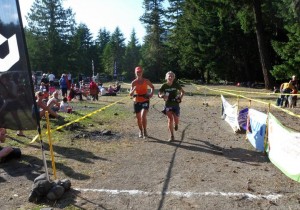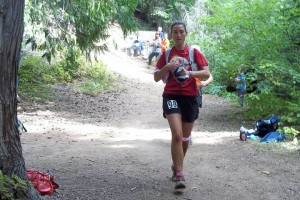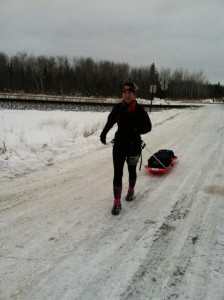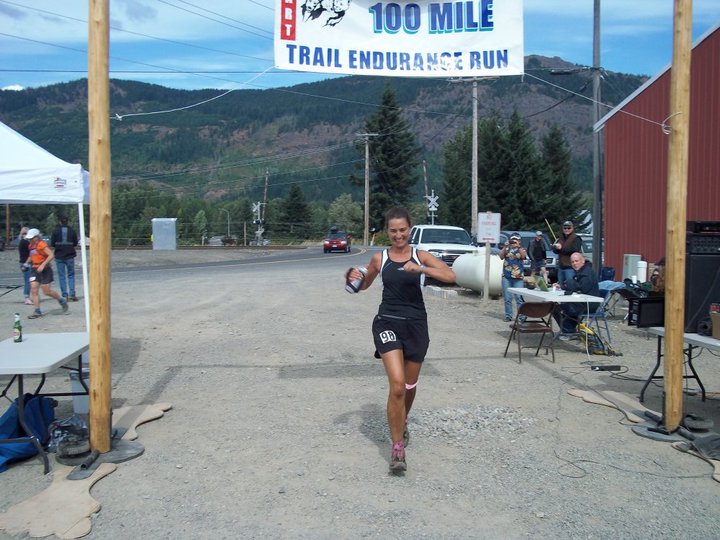By Tom Rohrer
 For the average person, a jog of two to three miles is considered a long run, with a marathon tucked away in the mind as impossible.
For the average person, a jog of two to three miles is considered a long run, with a marathon tucked away in the mind as impossible.
However, the 26 miles and change of a marathon is not even a quarter of what North Thurston High School science teacher and cross country coach Heidi Perry considers to be a challenging race.
 The running enthusiast has participated in a handful of what would be considered ultra-marathons, journeys of 100 miles or more that take over a day to complete.
The running enthusiast has participated in a handful of what would be considered ultra-marathons, journeys of 100 miles or more that take over a day to complete.
Perry most recently participated in the Badwater Ultramarathon Race in Death Valley, Calif., a 135 mile course considered to be one of the toughest (if not the) races in the whole world.
The July event turned out to be a milestone for Perry, as she considers it to be her greatest athletic accomplishments.
“It was a dream come true, and was basically my Olympics,” Perry said via phone interview with ThurstonTalk.com. “It was like winning the gold medal when I crossed the line. It was very special, especially with the crew of six people supporting me. Just awesome, no other way to put it.”
Since taking up ultramarathons in 2009, Perry has participated in four, one hundred mile events, and two 24-hour events, to go along with her finish at the Badwater.
 Not an athlete in high school, Perry began participating in 5 and 10K events in college, before running in marathons in Seattle, Portland and Olympia. The Moses Lake native, who has taught at North Thurston for fourteen years, says finding time to prepare for similar types of races is a necessity.
Not an athlete in high school, Perry began participating in 5 and 10K events in college, before running in marathons in Seattle, Portland and Olympia. The Moses Lake native, who has taught at North Thurston for fourteen years, says finding time to prepare for similar types of races is a necessity.
“If I have something to look forward to, something you feel so passionate about, it only brings more passion and joy to your life,” Perry said of preparing for a race. “It permeates my whole being. Sometimes, before school, I have to get a run in at 3 am. If you have to do it, you have to do it.”
Perry crossed the Badwater finish line with a time of 35 hours and 49 minutes, barely stopping throughout the race, and always moving forward.
“You play mind tricks with yourself, and there is lots of self-talk going on in my head,” Perry said. “I don’t look at whole distance, just get to the next station. At first, mentally, I would get beaten down. I never looked at my watch, I didn’t want to know how far to go and was in a state of complete oblivion. I guess over time, it evolved to self-talk. You have to be patient training or participating on 12 or 24 hour loops because you’re running the same loop over and over again. I focus on what’s outside of me and not inside.”
Leading up to the Badwater, where daytime temperatures on average reach 117 degrees Fahrenheit, Perry had to acclimate herself to the drastic conditions.
“You have to do acclimation training,” Perry said. “I have a sauna in my house and it works great for heat training. I also used the treadmill dressing up in hats and gloves and layers. It gets really hot. Fortunately it was a little cool for the event at 113 degrees (Fahrenheit). Normally it’s hotter.”
When participating in such a race, it’s imperative to have a support team present, which monitors everything going on with the athlete they follow.
 “Something like Badwater, its very intense for the crew,” Perry said. “They are awake, working their butts off, keeping you fed, keeping water bottles filled. It’s not a vacation for them. Very hands on. You want people who know you, that know about running and will kick you in the butt if necessary.”
“Something like Badwater, its very intense for the crew,” Perry said. “They are awake, working their butts off, keeping you fed, keeping water bottles filled. It’s not a vacation for them. Very hands on. You want people who know you, that know about running and will kick you in the butt if necessary.”
Running in such events allows Perry to connect with her students and cross country team athletes.
“I’ve learned a lot about goal setting, and I emphasize that with them,” Perry said. “They are still figuring out there bodies and going through that similar process of what works and doesn’t work. Students stay invested once they get to know and trust me. It resonates with them, and they realize how hard it is to work and accomplish goals with a full schedule.”
Despite the physical and mental demands of ultramarathons, Perry doesn’t appear to be slowing down anytime soon.
“It hurts,” Perry said. “It can be painful. But it’s exhilarating, addicting and rewarding in the end, and I’ve kept going. If I can keep going, I will continue to do so.”























































